TODAY’S READING FROM THE OLD TESTAMENT- 1 KINGS 9:1-10:29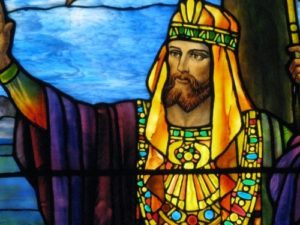
The Lord answers Solomon’s prayer.
2 Chronicles provides us with further detail.
2 Chronicles 7:1 1 Now when Solomon had finished praying, fire came down from heaven and consumed the burnt offering and the sacrifices, and the glory of the LORD filled the house.
After the Solomon’s construction projects are completed, the LORD appears to him a second time, as He had at Gibeon.
The Lord renews His promise and His warnings. He assures Solomon that He has consecrated the temple and put His Name there. His eyes and heart will be there for all time.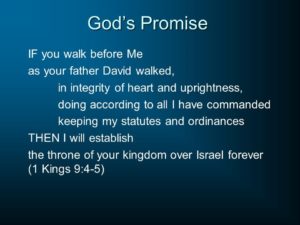
The conditions are clearly dependent upon Solomon’s performance- His uprightness of heart and obedience to God’s commandments. (Once again, this points to the need for the obedience of ‘the Greater Than Solomon’, Jesus Christ, to secure the blessings of God’s kingdom rule.)
The promise of establishing a lasting, unbroken Davidic dynasty was dependent upon Solomon’s obedience. But Solomon is once again warned that if he, or his descendants, turn aside from following the Lord, God will cut off Israel from the land and make Israel an object of ridicule in the eyes of the nations. He will make the temple a heap of ruins. This is a repetition of the warning that was given in the Mosaic covenant (Leviticus 26; Deuteronomy 28-30).
This judgment comes to pass when Israel is taken into Babylon for 70 plus years of captivity.
When the Lord refers to King David, He refers to David’s integrity of heart and not to his grievous sins of adultery, deception, murder and pride, for which he and his people paid dearly. The Lord was faithful to His covenant promise to forgive and put away David’s confessed sin.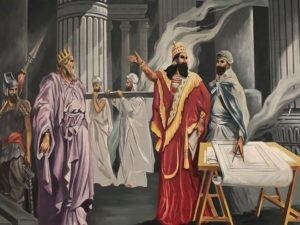
Solomon rewards the King of Tyre, Hiram, for his generous provisions of cedar, cypress timber and gold for the building projects in Jerusalem. He grants him twenty towns in Galilee. Hiram, however, was not pleased with this award, saying “What kind of towns are these?” The land has since been called, “Cabul” meaning, “Good for nothing.” This disdain for Galilean towns was present when Jesus began His public ministry there. “Can anything good come out of Nazareth?” (John 1:46). This is also why Galilee is to be known as Galilee of the Gentiles (Isaiah 9:1; Matthew 4:15).
We also learn that Hiram had sent Solomon 120 talents of gold after the construction projects were complete (1 Kings 9:14). Apparently, Solomon’s extravagance had gotten him into debt. His wisdom was great, but limited.
We learn how Solomon used those people from the nations defeated in war as conscripted labor (Amorites, Hittites, Perizzites, and Jebusites). We are told that the people of Israel were not made into slaves.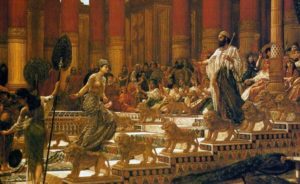
The Queen of Sheba visits Solomon and is overwhelmed. She confesses that she had heard impressive reports while in her country but did not believe. However she wanted to know the truth, so she came to see for herself. She also wanted to test Solomon with questions. She said:
1 Kings 10:7 7 “Nevertheless I did not believe the reports, until I came and my eyes had seen it. And behold, the half was not told me. You exceed in wisdom and prosperity the report which I heard.”
Jesus commended this event, showing that the Queen of Sheba proved to be more responsive to the light she was given than those witnessing His ministry. They were being given greater light, the Light of the World, in Him, and yet they showed no interest in receiving Him as the Expected Son of David.
Matthew 12:42 42 “The Queen of the South will rise up with this generation at the judgment and will condemn it, because she came from the ends of the earth to hear the wisdom of Solomon; and behold, something greater than Solomon is here.”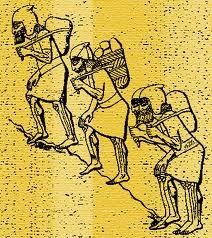
At the end of the chapter we learn about Solomon’s other projects, such as the construction of his throne, his building the wall of Jerusalem and ‘the Millo’, which archaeologists believe to be a stepped structure on the northeastern crest of the city. We are also told of his construction of outlying cities in Judah and cities for his horsemen and chariots.
We also learn of his business enterprises, his horse trading and his fleet of ships trading in precious metals. His kingdom was so prosperous and gold so abundant, that silver was considered common or of little value.
TODAY’S READING FROM THE NEW TESTAMENT – ACTS 8:14-40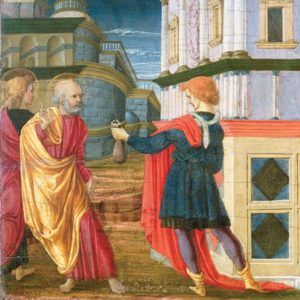
Simon Magus (the great), is a celebrity in Samaria, who wowed the crowd with his use of magic. He boasted of his greatness. He is an example of one who always desires to have the preeminence.
When Philip comes to Samaria and preaches the gospel, God grants him great success and many of the Samaritans come to believe and are baptized. Simon is seen to follow the crowd and appears to believe, following through with his profession of faith with baptism. But there is a question as to what Simon was ‘believing on’ and there is no evidence of his repentance of sin, as he had been exercising sorcery. Even demons believe some Biblical truths (James 2:19). Many who believed Jesus’ miracles, failed to trust Him as Lord and Savior (John 2:23-25; 6:66)
The Samaritans who believed are not baptized in the Spirit until the apostles, hearing of their receptivity to the Word, come to Samaria to lay hands on them. When they do so, the Holy Spirit comes upon them in power. There is no reference to their being suddenly gifted to speak in other languages, but it was an obvious ‘mini-Pentecost’ and those who received the Holy Spirit knew that they had received Him.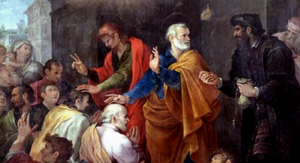
By delaying their receiving the Spirit until the apostles from Jerusalem arrived, God would be demonstrating the unity of the body of Christ, with its Jews, Samaritans, Gentiles, bond, free, male, female, young and old, all being one. They are all baptized in one Spirit, into one body, with one faith, one hope and one God and Father of all who is over all and through all and in all. (Ephesians 4:4-5).
The Apostle Peter had been given the keys to the kingdom of heaven (Matthew 16:13-20) and he had the privilege of opening the doors of faith to the Jews at Jerusalem when he preached the gospel at Pentecost. He would open the doors to the Samaritans in Acts 8, and to the Gentile Cornelius in Judea (Acts 10:34-38).
This is what Jesus predicted in Acts 1:8:
Acts 1:8 8 “But you will receive power when the Holy Spirit has come upon you; and you shall be My witnesses both in Jerusalem, and in all Judea and Samaria, and even to the remotest part of the earth.”
But Simon showed his true colors when he witnessed Peter and John laying their hands on the Samaritans as they received the Holy Spirit. Simon coveted that power, and offered the apostles money for it. (In today’s vocabulary, any attempt to purchase religious office or privilege is named after this man, ‘simony’.)
Peter soundly rebukes Simon Magus, because he recognizes by the Spirit, the corrupt motives in his heart.
Acts 8:20-23 20 But Peter said to him, “May your silver perish with you, because you thought you could obtain the gift of God with money! 21 You have no part or portion in this matter, for your heart is not right before God. 22 Therefore repent of this wickedness of yours, and pray the Lord that, if possible, the intention of your heart may be forgiven you. 23 For I see that you are in the gall of bitterness and in the bondage of iniquity.”
We don’t know what happened to Simon, other than that he asks that Peter pray for him and that he would be spared of divine judgment. Did he ever repent and get saved? There is no reference to Simon having ever received the Holy Spirit, or having believed the gospel with his whole heart (see Acts 8:37). Simon was following Philip to witness the miracles and to learn how to do them. There is no evidence that he trusted the Lord Jesus Christ for salvation. Nor is there evidence of life change.
The Apostles John and Peter now have an open door to preach the gospel in many Samaritan villages as they return to Jerusalem. Meanwhile, an angel of the Lord directs Philip to go south to the road that goes from Jerusalem to Gaza. There he has a divine appointment. He meets a God-fearing Ethiopian eunuch, an officer in charge of the treasury of the Ethiopian queen Candace. He happens to be reading Isaiah 53 when Philip is directed by the Holy Spirit to run and catch up with the chariot. Philip offers to give the eunuch a Bible Study!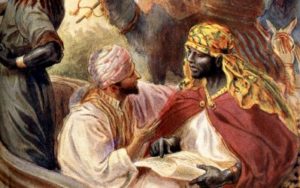
Philip explains that the suffering servant described in Isaiah 53 is Jesus of Nazareth.
This is a good reminder of the life-saving purpose of Bible Study.
Acts 8:35 35 Then Philip opened his mouth, and beginning from this Scripture he preached Jesus to him.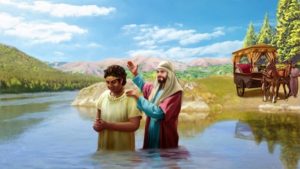
As they travel along, they see water. The eunuch is eager to seal his testimony of faith with the outward act of obedience to the gospel, by being baptized.
This is clearly a case of baptism by immersion. Both Philip and the eunuch go down into the water and come up out of the water.
The Spirit suddenly takes Philip away, leaving the Ethiopian eunuch rejoicing. The next time Philip is seen, he is preaching the gospel at Azotus and in all the towns he passes as he travels to Caesarea.
TODAY’S READING FROM THE BOOK OF PSALMS- PSALM 130:1-8
“De Profundis” (“Out of the Depths”). This Psalm is a classic and often set to music.
It is the sixth of seven Penitential Psalms, demonstrating what God does for people who call out to Him for mercy, particularly those who are being disciplined. (Psalms 32, 38, 51, 102, 130, and 143).
The Psalmist sees himself as a helpless sinner drowning in the sea in need of rescue (v.1-2)
We then are taken to the courtroom where he sees himself as a condemned criminal in need of acquittal.
The Psalmist realizes that it is only by grace that we can be made right with God.
Psalm 130:3-4 3 If You, LORD, should mark iniquities, O Lord, who could stand? 4 But there is forgiveness with You, That You may be feared.
We are then taken to the city walls where the watchmen are posted to be on the look out for any danger. The watchman knows that his relief comes with the morning.
Psalm 130:5-6 5 I wait for the LORD, my soul does wait, And in His word do I hope. 6 My soul waits for the Lord More than the watchmen for the morning; Indeed, more than the watchmen for the morning.
Verses 5 and 6 picture expectant faith. We wait on the Lord with a solid hope in His precious promises.
The final stanzas remind us of these promises.
Psalm 130:7-8 7 O Israel, hope in the LORD; For with the LORD there is lovingkindness, And with Him is abundant redemption. 8 And He will redeem Israel from all his iniquities.
TODAY’S READING FROM THE BOOK OF PROVERBS- PROVERBS 17:2-3
Proverbs 17:2-3 2 A servant who acts wisely will rule over a son who acts shamefully, and will share in the inheritance among brothers. 3 The refining pot is for silver and the furnace for gold, But the LORD tests hearts.
PRAY FOR THE NATIONS – GUYANA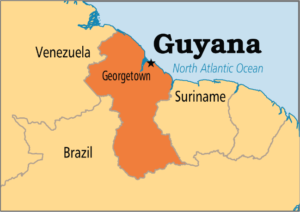
Guyana
Cooperative Republic of Guyana
Latin America
Geography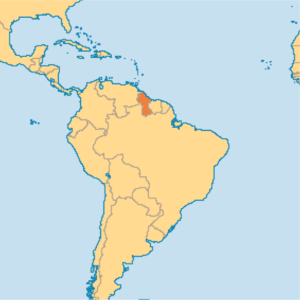
Area: 215,000 sq. km
On the north coast of South America. A developed coastal strip with under-developed, forested interior.
Population: 761,442 Annual Growth: -0.06%
Capital: Georgetown
Urbanites: 28.5%
HDI Rank: 114 of 182 (UN Human Development Reports 2009)
Peoples
Peoples: 22 (9% unreached) All peoples
Unreached Peoples Prayer Card
Official language: English; Creole used by 90% of the population Languages: 19 All languages
Religion
Largest Religion: Christian
|
Religion |
|
Pop % |
Ann Gr |
|
401,128 |
52.68 |
0.0 |
|
|
150,993 |
19.8 |
1.0 |
Challenges for Prayer
Guyana seems to exist precariously on many levels. It is constantly under threat from persistent claims on its land by Venezuela and Suriname. The political sphere is defined along racial lines. The economy is vulnerable to the climate, as the disastrous floods of 2005 attest. Large-scale emigration has denuded the country of much of its population, including many of the most gifted. Pray that an enduring hope might come to Guyana, most expressly through the transformation that only the gospel can enact.
There is a vital, vibrant, growing evangelical witness, and evangelicals are found in all levels of society. Pentecostal, charismatic (“clap-hand”) and evangelical denominations and fellowships continue to grow despite negative population growth. Churches are still largely divided along racial lines, but the multiracial congregations that do exist are some of the few ethnic bridges in the country. The cross-denominational work of the Guyanese Evangelical Fellowship is vital in this area. Pray for all believers to demonstrate the power of the gospel in their unity, in their words and in holy living.
PRAYER: God of grace and glory, You are faithful to answer prayer. You have given us refuge and assured mercies as we cleave to the merits of Your Son. We thank You that You are a Good Father, and that you discipline those that You love and test their hearts. You hear us when we cry out to You. You are the Strong Arm of Rescue to the drowning man, the Perfect Defender to the convicted man, and the Assured Hope for deliverance to the watchman. With You there is lovingkindness and abundant redemption. We pray that the Holy Spirit will direct us so that we will have divine appointments with hearts ready to hear. As we sanctify Christ as Lord in our hearts, may our tongues be ready to preach the good news of Your Son. In Jesus’ Name. Amen.
